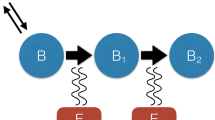Abstract
Hastings [12] recently provided a proof of the existence of channels which violate the additivity conjecture for minimal output entropy. In this paper we present an expanded version of Hastings’ proof. In addition to a careful elucidation of the details of the proof, we also present bounds for the minimal dimensions needed to obtain a counterexample.
Similar content being viewed by others
References
Amosov G.G.: Remark on the additivity conjecture for the quantum depolarizing channel. Probl. Inf. Trans. 42(2), 69–76 (2006)
Amosov, G.G.: The strong superadditivity conjecture holds for the quantum depolarizing channel in any dimension. Phys. Rev. A 75(6), P. 060304 (2007)
Amosov G.G., Holevo A.S., Werner R.F.: On some additivity problems in quantum information theory. Prob. Inf. Trans. 36, 305–313 (2000)
Bhatia, R.: Matrix Analysis. Graduate Texts in Mathematics 169, Berlin-Heidelberg-NewYork: Springer, 1997
Bronk B.V.: Exponential ensemble for random matrices. J. Math. Phys. 6, 228 (1965)
Bruss D., Faoro L., Macchiavello C., Palma M.: Quantum entanglement and classical communication through a depolarising channel. J. Mod. Opt. 47, 325 (2000)
Cover T.M., Thomas J.A.: Elements of Information Theory. NewYork, John Wiley and Sons (1991)
Cubitt T., Harrow A.W., Leung D., Montanaro A., Winter A.: Counterexamples to additivity of minimum output p-Renyi entropy for p close to 0. Commun. Math. Phys. 284, 281–290 (2008)
Fujiwara A., Hashizume T.: Additivity of the capacity of depolarizing channels. Phys. Lett. A 299, 469–475 (2002)
Fukuda M.: Simplification of additivity conjecture in quantum information theory. Quant. Info. Proc. 6, 179–186 (2007)
Fukuda M., Wolf M.M.: Simplifying additivity problems using direct sum constructions. J. Math. Phys. 48, 072101 (2007)
Hastings M.B.: A Counterexample to additivity of minimum output entropy. Nature Physics 5, 255–257 (2009)
Hayden P., Leung D.W., Winter A.: Aspects of generic entanglement. Commun. Math. Phys. 265(1), 95–117 (2006)
Hayden P., Winter A.: Counterexamples to the maximal p-norm multiplicativity conjecture for all p > 1. Commun. Math. Phys. 284(1), 263–280 (2008)
Holevo A.S.: The capacity of the quantum channel with general signal states. IEEE Trans. Inf. Theory 44(1), 269–273 (1998)
Holevo A.S.: On complementary channels and the additivity problem. Prob. Th. and Appl. 51, 133–143 (2005)
King C.: Additivity for unital qubit channels. J. Math. Phys. 43, 4641–4653 (2002)
King C.: The capacity of the quantum depolarizing channel. IEEE Trans. Info. Theory 49, 221–229 (2003)
King C., Nathanson M., Ruskai M.B.: Multiplicativity properties of entrywise positive maps. Lin. Alg. Appl. 404, 367–379 (2005)
King C., Ruskai M.B.: Minimal entropy of states emerging from noisy quantum channels. IEEE Trans. Info. Theory 47, 192–209 (2001)
Lloyd S., Pagels H.: Complexity as thermodynamic depth. Ann. Phys. 188, 186–213 (1988)
King C., Matsumoto K., Nathanson M., Ruskai M.B.: Properties of conjugate channels with applications to additivity and multiplicativity. Markov Processes and Related Fields 13(2), 391–423 (2007)
Page D.N.: Average entropy of a subsystem. Phys. Rev. Lett. 71, 1291 (1993)
Sanchez-Ruiz J.: Simple proof of pages conjecture on the average entropy of a subsystem. Phys. Rev. E 52, 5653 (1995)
Schumacher B., Westmoreland M.D.: Sending classical information via noisy quantum channels. Phys. Rev. A 56(1), 131–138 (1997)
Sen S.: Average entropy of a quantum subsystem. Phys. Rev. Lett. 77(1), 13 (1996)
Shor P.W.: Equivalence of additivity questions in quantum information theory. Commun. Math. Phys. 246(3), 453–472 (2004)
Werner R.F., Holevo A.S.: Counterexample to an additivity conjecture for output purity of quantum channels. J. Math. Phys. 43(9), 4353–4357 (2002)
Zyczkowski K., Sommers H.-J.: Induced measures in the space of mixed quantum states. J. Phys. A 34, 7111–7125 (2001)
Author information
Authors and Affiliations
Corresponding author
Additional information
Communicated by M.B. Ruskai
Rights and permissions
About this article
Cite this article
Fukuda, M., King, C. & Moser, D.K. Comments on Hastings’ Additivity Counterexamples. Commun. Math. Phys. 296, 111–143 (2010). https://doi.org/10.1007/s00220-010-0996-9
Received:
Accepted:
Published:
Issue Date:
DOI: https://doi.org/10.1007/s00220-010-0996-9



